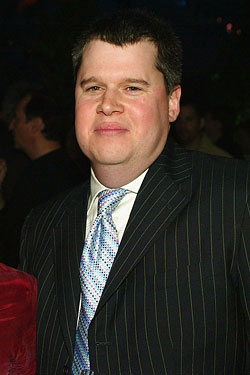
Daniel Handler is the brains and pen behind Lemony Snicket, the mopey and often hilarious writer of the Unfortunate Events series (among many other dark tales), and, now, The Composer Is Dead, a murder mystery in which everyone in the orchestra is a suspect — and the butt of a joke (the second violins are more fun at parties; the woodwinds are sneaky; the trombones are partiers, etc.). Handler, who’s actually an accomplished classical musician, narrates the story accompanied by the Orchestra of St. Luke’s tomorrow afternoon at Carnegie Hall (this is also available as a book with CD from HarperCollins). Handler spoke to us about his childhood as a boy soprano, the sinister nature of orchestras, and why reading about murder and heavy drinking might do children some good.
The jokes about the varied instruments in this book are so spot-on. Did you spend time in youth orchestras?
I definitely had tons of music in my childhood; I was a Suzuki piano student for like fifteen years and I was in the San Francisco Boys Chorus, as a boy soprano.
Was the boys chorus fun or traumatic?
Definitely both. I’ve never thrived in an all-male environment. The boys chorus was run by a strict taskmaster who treated it kind of like a military establishment. I wasn’t actually teased mercilessly or anything; I always imagine I had something in common with the 12-year-old girl gymnast who’s ranked nationally. Then my voice changed and that kind of wrecked my career.
Did your parents really joke about castrating you to prolong said career?
Yeah, they did. It was kind of a constant joke.
Was morbid humor like that a constant in your house?
Oh, absolutely. My father’s side of the family in particular is all mostly German Jews who fled during the Holocaust and left behind people who were decimated; so there was a real sense that life was a strange journey, and that was a subject of much hilarity.
How did the title The Composer is Dead come about?
Well, I first thought the idea would be to do a murder mystery, so each section of the orchestra could be questioned. As I thought about it more, it seemed perfect, because composers can’t wait to be dead because only then will anyone listen to them, probably. It seemed good to take all the treachery and backstabbing that happens within an orchestra, between an orchestra and conductor and an orchestra and composer, that you could take the title literally.
Did you ever feel that there was something inherently sinister about orchestras?
Oh most certainly. It seems like a cabal. People get dressed up, carrying strange cases, and they meet in a room and come out onstage and they’re all playing different things that somehow cohere. There’s the ghost of a conspiracy theory over an orchestra, I think.
You’re an accordionist and are known for playing with the Magnetic Fields. What made you take it up?
I had taken piano forever, and then when I got to college I wanted to be in a band. It was during this brief moment in American popular music when no keyboard instruments were cool, and I spotted an accordion at Columbo Brothers in Marin County, and I just bought one. I often say I’m probably the first person in history who took up the accordion to meet women.
And to drive your parents crazy, I’ve heard?
That was a side benefit, definitely. They acted as if I’d taken up hard drugs. I remember when I was in a band back in San Francisco, and I told my parents to come see me, and they really expressed a fear that when I started to play the accordion my life would be in danger. I’m not sure what their fear was. My mother thought the accordion was a gentile instrument, which is ridiculous — it’s steeped in Jewish culture.
Are you still playing with the Magnetic Fields? You and Stephin Merritt seem to a share a proclivity for a downtrodden tone.
I am, yeah. I was just in the recording studio a few days ago, laying down tracks, as they say in the business, for their new album. Mr. Merritt and I have always gotten along really well, and it doesn’t hurt that we both prefer melancholy over cheer.
There’s murder, heavy drinking, and a “confirmed bachelor” in this book, which is ostensibly for children. Is there ever any worry about how appropriate for children your books are — or do your editors just throw that out the window?
No, I’m asked this a lot about every book, and there’s never anything. It’s funny you would use those three examples, because I can think right away of instances in Unfortunate Events when there’s confirmed bachelors, heavy drinking, and most certainly violence. I’ve been lucky that the Snicket books have done well enough that I think now maybe they wouldn’t dare question it. When I was a child I loved to read about those things. I’ve never quite understood what the issue is. There’s always this kind of, “Well what if my child reads that … ?” and I always wonder, What is the rest of that sentence? That they then become a serial rapist? Like, concern that your child is drinking, I understand. Concern that your child is reading about drinking just doesn’t seem the same to me.




